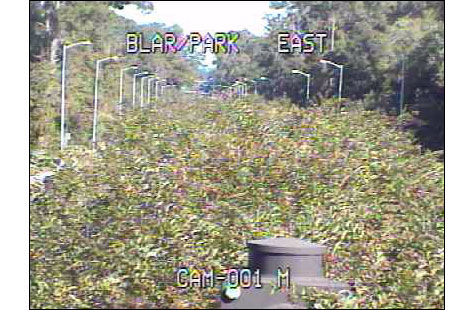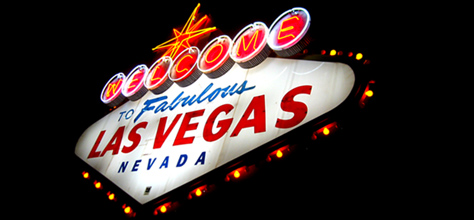
Over the past few months, several new specialty businesses have opened in Tallahassee. With names like
Sands Internet Café and
Dino Dino Internet Café, one might conclude these new shops are catering to people without home internet access or those telecommuting to work.
The primary business, however, is a new form of gambling becoming popular in Florida and other states: the computer-based sweepstakes.
After purchasing time on a computer, patrons can play casino-like games and win prizes including cash. Since the prizes are awarded to predetermined sweepstakes winners and not by chance, these establishments take advantage of a loophole in many jurisdictions' gambling laws.
As they become more prevalent, the sweepstakes cafés are not going unnoticed by some local officials.
Mike Carmolingo, City Commissioner in Deltona, Florida, recently oversaw the unanimous
passage of an ordinance prohibiting new internet cafés from opening for six months.
"What they really are is gambling houses," he told the
Daytona Beach News-Journal. He is hoping the Deltona ordinance will eventually lead to an outright ban, like in North Carolina where internet cafés become
non grata on 01 December 2010.
Earlier this year the
Independent Weekly gathered information on the demographics of sweepstakes cafés in that state. Their research revealed that many of the burgeoning cafés exist in low-income minority neighborhoods of Durham, Raleigh and Burlington.
Senator Floyd McKissick, Jr. (NC-D) expressed his concern about gaming rooms masquerading as internet cafés saying, "...we need a way to identify businesses that are exploiting vulnerable populations who are using their limited resources on gambling."
Not all public officials are against the new ventures. Three months ago in Fall River, Massachusetts, City Councilor
Leo Pelletier opened the
New England Internet Café or "Leo's Place." It is apparently one of the few sweepstakes cafés in the state, having garnered little if any negative attention.
Says customer Diane Zumuda, "We come here, go on the Internet, play some games, hang out. It's a fun thing to do."
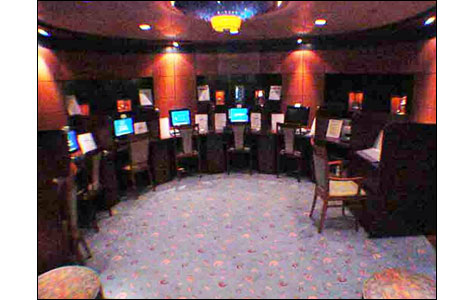
Back at home
Pat Fowler, Executive Director of the
Florida Council on Compulsive Gambling, says the businesses are "hitting the state in huge numbers," which is of concern to the group. Fowler
told the Tampa Tribune they have seen a sudden increase in calls over problem gaming to which they attribute the proliferation of sweepstakes cafés in the Sunshine State. In Hernando County, for example, at least fourteen have opened in recent months.
There are at least four here in Tallahassee. The first to catch my attention was Sands Internet Café at 4176 Apalachee Parkway. Formerly the location of
Smokie's Barbeque, Sands appears to have the typical setup including "internet café" and "sweepstakes" signage outdoors. I do not know their hours of operation, but I drive past Sands every Sunday morning between 0200–0400 and the parking lot is always busy.
A mile west is Dino Dino Internet Café, 3618 Apalachee Parkway, occupying the former
Gas Mart convenience store. Within walking distance of that, a new sweepstakes banner recently went up at
NYK Internet Café, 3404 Apalachee Parkway. Finally, someone at the
Urban Tallahassee forum
reports the opening of
Lucky Hit Internet Café last month at 3839 North Monroe Street.
So just where do these businesses stand legally? In May 2010,
the New York Times reported the Florida Attorney General's position "that while it considers sweepstakes cafés to be in violation of state law, it is up to local law enforcement to decide whether illegal gambling is indeed taking place."
The
Florida Department of Agriculture and Consumer Services regulates sweepstakes, which by definition in
Chapter 849 Florida Statutes cannot have an associated purchase or entry fee requirement. The statute also requires agency notification of prizes greater than $5,000, meaning this is likely the highest possible winnings amount at these cafés. Furthermore, as devices that accept coins and paper currency are expressly prohibited, players exchange cash for electronic points and cards used for gaming.
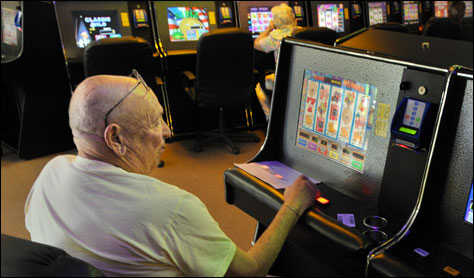
As more state legislatures take up the issue, some local law enforcement agencies have been reluctant to act while others are taking active measures. Casselberry, Florida
Chief of Police James C. Ruf cites the lack of "clear direction from anyone" as one of his frustrations in trying to deal with the new businesses. Meanwhile, police in Roanoke and Virginia Beach, Virginia as well as Lynn, Massachusetts have
raided and closed businesses citing violations of promotional sweepstakes laws.
At the same time, poker rooms at Florida pari-mutuel facilities are
seeing record revenues due in part to the July 2010
law that eliminated buy-in limits and increased the permissible hours of operation. Legal wagering of this type is allowed at the several horse tracks, dog tracks and Jai Alai frontons operated statewide as well as at all seven
Seminole casinos.
In April 2010,
Governor Charlie Crist signed the Seminole Tribe Gaming Compact into law, which in addition to pumping $1 billion into the state's coffers, grants exclusive rights to operate slot machines, blackjack and baccarat games at some of their facilities.
Back in North Carolina, the
Chadbourn Town Council is
leaving nothing to chance. They will hold a public hearing in early December on an ordinance regulating gaming cafés, just in case the statewide ban is later overturned.
It is an uncertain future for the likes of Sands and Dino Dino. Until state or local officials decide their fate, it looks like the house will continue to win. We can only hope that the proprietors of these businesses will encourage responsible play and not blindly enable those experiencing tough financial times to flush what little they have away, all for the chance to "win it big."
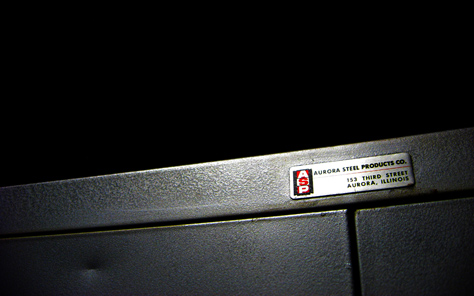 I made the widescreen edition of this photograph because I thought it would make a nice desktop wallpaper.
Unfortunately, there is not much information online regarding Aurora Steel Products Co. of Aurora, Illinois. They operated at the address on the cabinet, 153 Third Street, from 1956 to 1973 if not longer. I was unable to locate corporate filings with the State of Illinois but at some point, the 130-year-old Richards-Wilcox, Inc. purchased ASP and continues to manufacture some Aurora-branded products.
I made the widescreen edition of this photograph because I thought it would make a nice desktop wallpaper.
Unfortunately, there is not much information online regarding Aurora Steel Products Co. of Aurora, Illinois. They operated at the address on the cabinet, 153 Third Street, from 1956 to 1973 if not longer. I was unable to locate corporate filings with the State of Illinois but at some point, the 130-year-old Richards-Wilcox, Inc. purchased ASP and continues to manufacture some Aurora-branded products.







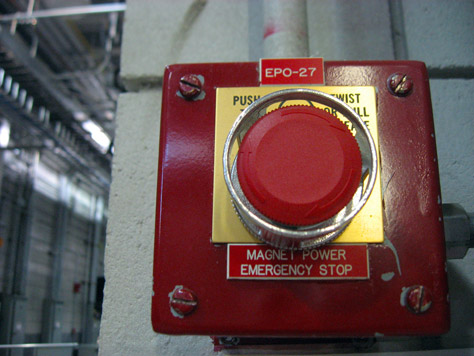
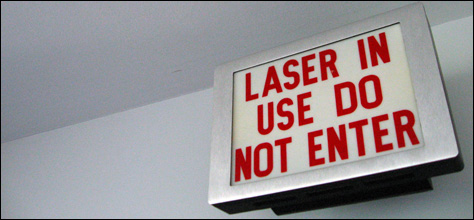
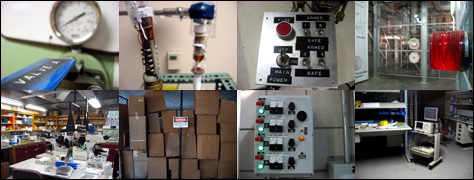 Since Thomas works at the Mag Lab, he was able to provide us with a customized walk-through highlighting his own workspaces and some of the laboratory's more interesting equipment. There were no other people at the Shaw Building, our first stop and home to the NHMFL
Since Thomas works at the Mag Lab, he was able to provide us with a customized walk-through highlighting his own workspaces and some of the laboratory's more interesting equipment. There were no other people at the Shaw Building, our first stop and home to the NHMFL 


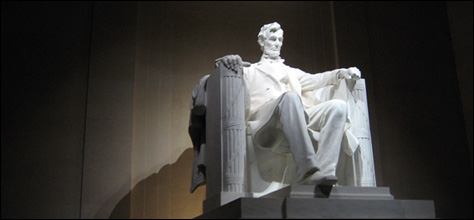
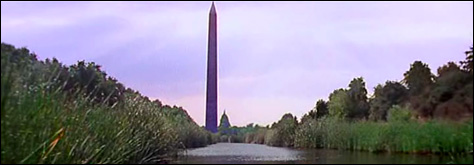 It was the only thing I could think of earlier today when I saw the image broadcast from a
It was the only thing I could think of earlier today when I saw the image broadcast from a 